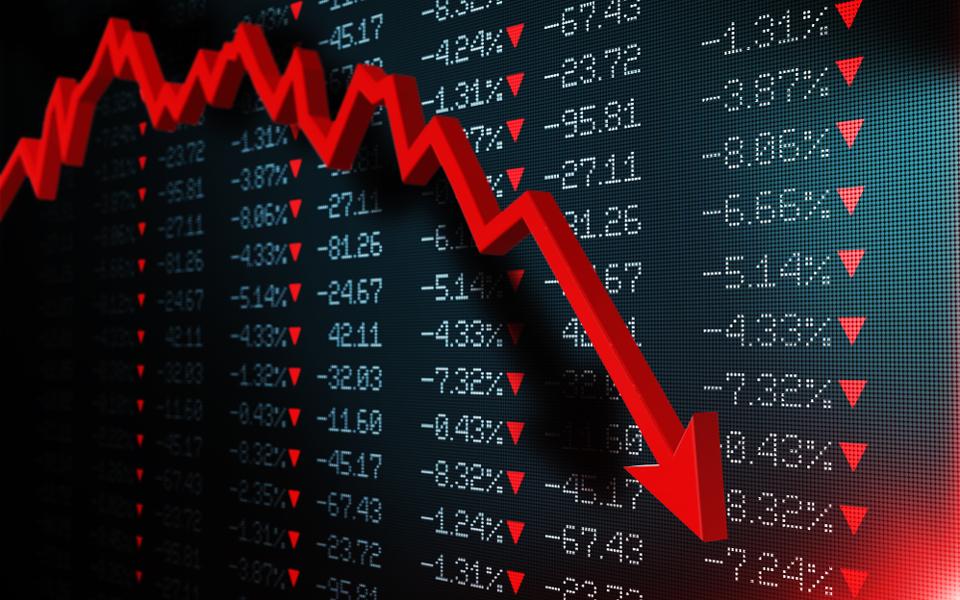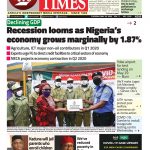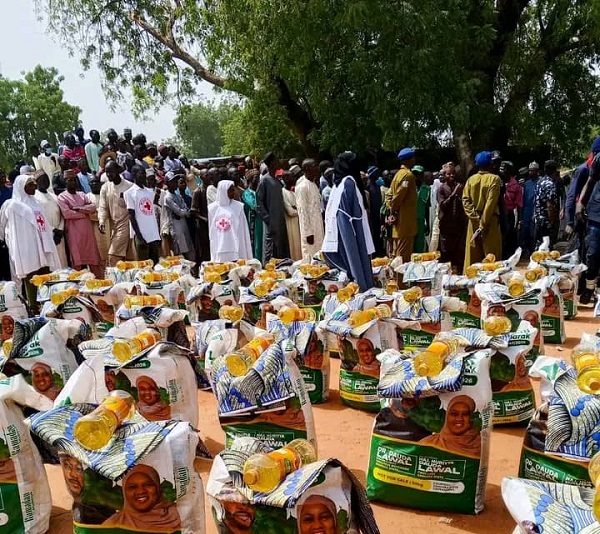Declining GDP: Recession looms as Nigeria’s economy grows marginally by 1.87%

…Agriculture, ICT major non-oil contributors in Q1 2020
…Experts urge FG to direct credit facilities to critical sectors of economy
…NECA projects economic contraction in Q2 2020
Philip Clement, Abuja
There are clear indications that Nigeria may be heading for another recession due to the global economic downturn, even as the nation’s Gross Domestic Product (GDP) recorded a paltry 1.87 per cent growth in the first quarter of 2020.
The Nigeria Bureau of Statistics (NBS) in its latest report on Nigeria’s GDP noted that it grew by 1.87 per cent (year-on-year) in real terms in the first quarter of 2020.

Considering the figure on a quarterly basis, the real GDP growth stood at –14.27per cent compared to 5.59per cent recorded in the preceding quarter.
Nigeria’s Finance minister, Zainab Ahmed, last week painted a gloomy picture of the economy when she announced at the National Economic Council (NEC) meeting that the country slid into a negative in the first quarter of the year following a shortfall of N425.52 billion representing 31.1 per cent in its oil revenue.
The nation recorded only N940.90 billion as against N1.366 trillion oil revenue projected to come into the treasury between January and March 2020.
“The net oil and gas revenue inflows to the federation account in Q1 2020 amounted to N940.91 billion. This represents a shortfall of N425.52 billion or 31.1 per cent of the prorated amount,” according to Ahmed, who stated that Nigeria is faced with perhaps the most challenging economic challenge in its history.
In the Bureau’s comparison to the first quarter of 2019, the performance recorded in Q1 2020 represents a drop of –0.23 per cent points compared to Q1 2019 and –0.68 per cent points compared to Q4 2019, reflecting the earliest effects of the disruption, particularly on the non-oil economy.
The report was recorded against the backdrop of significant global disruptions resulting from the COVID-19 public health crisis, a sharp fall in oil prices, and restricted international trade.
Oil prices plunged below plunged below the benchmark for the 2020 budget in the first quarter, creating dislocation and causing a review of the year’s fiscal policy in the second quarter.
According to NBS in the quarter under review, aggregate GDP stood at N35, 647,406.08 million in nominal terms.
“This performance was higher when compared to the first quarter of 2019 which recorded N31, 824,349.67 million, with a nominal growth rate of 12.01 per cent year on year.
“Relative to the first quarter of 2019, the nominal growth rate was higher by 0.11 per cent points but lower than the preceding quarter by –0.32 per cent points respectively,” the NBS said.
The non-oil sector was reported to have contributed 90.50 per cent to the nation’s GDP in the first quarter of 2020, less than its share in the first quarter of 2019 which was 90.78 per cent and the fourth quarter of 2019 recorded as 92.68 per cent.
COVID -19: Trado-medicine expert commends govt’s support to local herb producers
The non-oil sector was driven mainly by information and communication (telecommunications), financial and insurance (financial institutions), agriculture (crop production), mining and quarrying (crude petroleum & natural gas), and construction.
Activities that witnessed weaker performance relative to Q1 2019 include quarrying, road transport, accommodation, and food services as well as real estate.
During the first quarter of 2020, the NBS reported average daily oil production of 2.07 million barrels per day (mbpd), higher than the 1.99mbpd recorded in Q1 2019 by 0.08mbpd and the fourth quarter of 2019 by 0.06mbpd.
The situation is global owing to the coronavirus crisis with health and economic implications across the world.
Speaking to Daily Times with regards to the report, renowned economist and first Professor of Capital markets in Nigeria, Uche Uwaleke, said the report did not come as a surprise to him.
According to him, sectors that pushed growth did not have much disruptions during the lockdown directives by the Federal Government which was caused by the Coronavirus.
“Against the backdrop of the negative impact of COVID’19 on the economy, the supply chain disruptions, the associated public health crisis and the collapse in oil price, the drop in the country’s real GDP growth rate from 2.55per cent in the 4th quarter of 2019 to 1.87per cent in the following quarter, that is Q1 of 2020, should not come as a surprise to anyone.
“Little wonder, the non-oil sectors that drove growth included ICT, Financial Institutions and Agriculture which experienced relatively fewer disruptions.
“On the other hand, the sectors that recorded the highest drop included Road transport and Accommodation/hotel industry due in part to the movement restrictions and lockdown in many towns and cities in Nigeria. As a matter of the fact, the drop in real GDP growth rate would have been more severe but for the moderating impact of the relatively greater tempo of economic activities in the month of January,” he said.
Speaking further, he noted that agriculture and other sectors of the economy must now be critically looked into as drop in crude oil prices may have adverse effects on the economy going forward.
“It is instructive to note that while the Non-oil sector with over 90 percent contribution to GDP managed to eke out a growth rate of 1.55 per cent, the oil sector grew by 5.06 percent. By extension, the growth in Q1 2020 was powered by the oil sector that contributed just 9.5 percent of GDP.
“This has implications for economic planning going forward. First, the oil sector performance was based on average crude oil production of 2.07mbpd. This may not be achieved again this year given that the 2020 revised budget is based on 1.94mbpd in tune with OPEC cut agreement. So, the oil sector’s real GDP growth rate will be negatively impacted in 2020.
“This is the more reason much attention should be shifted to the Non-oil sector especially Agriculture, health, Education and the enabling infrastructure such as power, roads and ICT. Mechanised farming will go a long way in boosting food production.
“Doing so will bring down food inflation which was over 15% as of April according to the NBS.
“Secondly, there is no doubt that the CBN’s interventions in Agriculture, especially the Anchor Borrower Scheme, has helped in no small measure to grow the sector. It is time to expand and scale up the interventions to cover more products and States of the Federation,” Uwaleke further explained.
Recall that the International Monetary Fund (IMF) has projected that the Nigerian economy will shrink by -3.4 per cent this year.
As such, Uwaleke revealed that “in order to reduce the size of the economic recession below forecast global average of -3per cent, it is important that the COVID’19 stimulus packages both by the government and the CBN are well targeted and executed in ways that will protect jobs and speedily reverse the present a downturn in economic activities”.
Similarly, an economist and Chief Executive Officer of Global Analytics Limited, Good Fasua, while speaking to Daily Times on the development, said the recent GDP report indicates that a recession is imminent.
He added that the situation calls for urgent revival of key sectors of the economy to boost growth.
“As you know GDP is stated in dollars, so when you convert it to naira, you will realise that GDP has dropped significantly.
“Consequently, recession is measured in two ways, first is by quarterly consecutive drop of GDP and secondly if the GDP drops by -5%, then a country is headed towards recession. However, in our case, ours contracted by -14.27 per cent which means we have even exceeded the threshold,” he said.
Speaking further, Fasua advised the Central Bank of Nigeria and the Ministry of Finance to channel the COVID palliatives and Stimulus package to manufacturing and the agricultural sector and getting them back on track to produce what Nigeria needs.
He noted that the coronavirus pandemic has brought huge opportunities to diversify the economy and Nigeria cannot be left out.
“COVID-19 pandemic has taught us that every country is on its own. Thus it offers huge opportunity for Nigeria to look inwards and produce what it wants to eat. As such we can produce whatever we want to eat and meet even demands of other countries when we have it in excess,” he added.
Fasua further stated that he foresees the world going into recession except for countries that are smart enough to rescue critical sectors and make them proactive and productive.
“Already IMF had predicted a 12 per cent drop in global GDP. Also, Deutsche Bank has also predicted a drop in global GDP by 13%. So what it entails is that the entire world may fall into recession and Nigeria is not an exception”.
Meanwhile, Nigeria’s economy is projected to contract in the second quarter of 2020 due to the six weeks lockdown on some parts of the country, Nigeria Employers’ Consultative Association (NECA) has said.
In a statement reacting to the latest Q1 2020 Gross Domestic Product (GDP) report released by National Bureau of Statistics (NBS) which said that Nigeria’s economy grew by 1.87%, NECA said the real impact of COVID-19 on the economy would be felt in the Q2 GDP result due to the commencement of the lockdown in April.
It stated that the slowdown in the GDP growth reflects the earliest effects of the disruptions on non-oil economy, coupled with an escalating war of words between the U.S. and China which resulted into low demand in global oil.
“The lockdown of the Nigerian economy commenced in April due to the pandemic, therefore, the real impact of COVID-19 on the economy would be felt in the Q2 GDP result. We applaud the managers of the economy, as the economy grew faster than expected in the first quarter because of a boost in oil production.
“We anticipate contraction in the second quarter, as the economy witnessed a 6 week’s lockdown on the commercial nerves of the country, and similar trend witnessed in global economy, except China, whose consumption of fuel due to opening of industrial hubs and transportation could portends mild positive growth pattern due to demand for crude oil,” the body stated.
The employers association called for more fiscal and monetary policies aimed at boosting non-oil sector to help salvage the economy from external shocks.
“There is the need for the Fiscal and Monetary authorities to develop a more aggressive and decisive policies to sustain an economic recovery in the wake of further low oil prices.
We believe that a more coordinated stimulus packages targeted at the worst-hit sectors of the economy would sustain the economy from experiencing contraction of 8.9% as predicted,” the association added.










